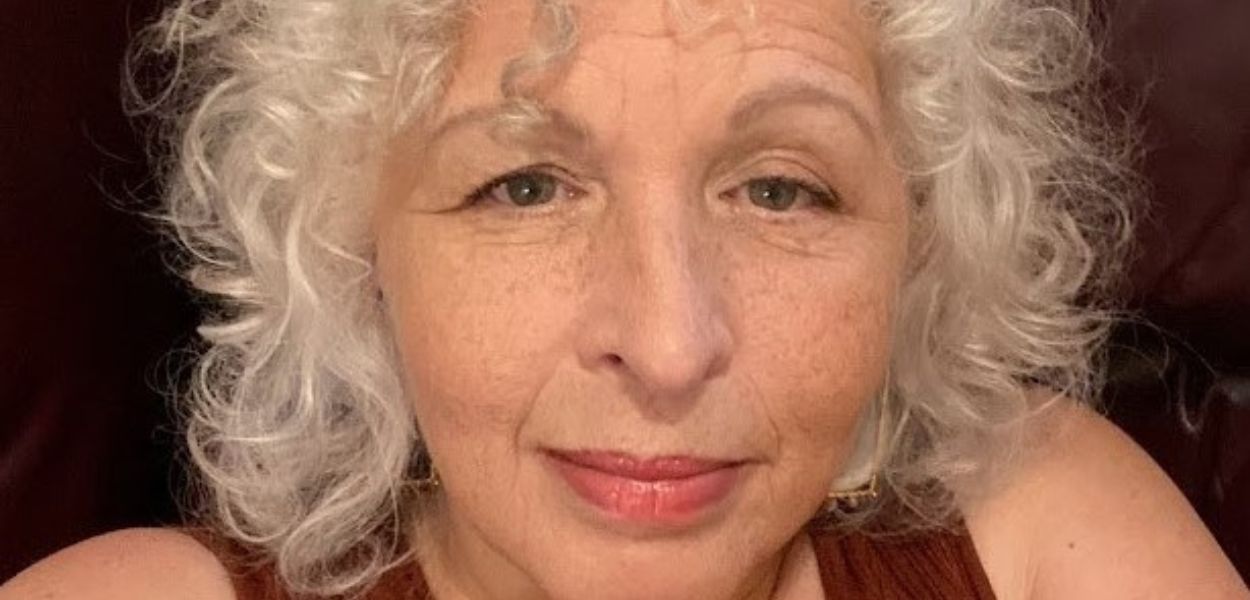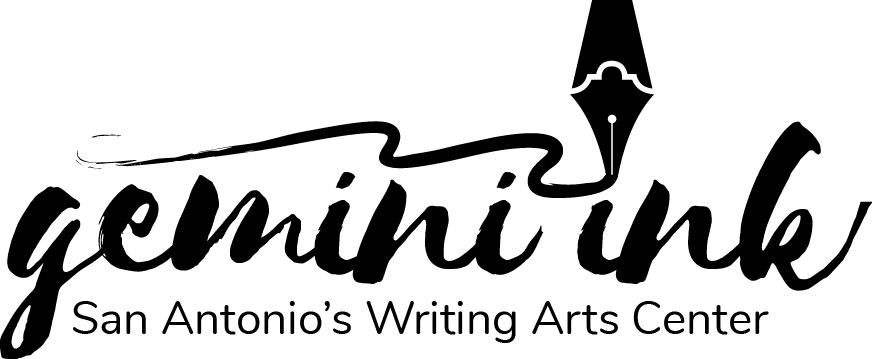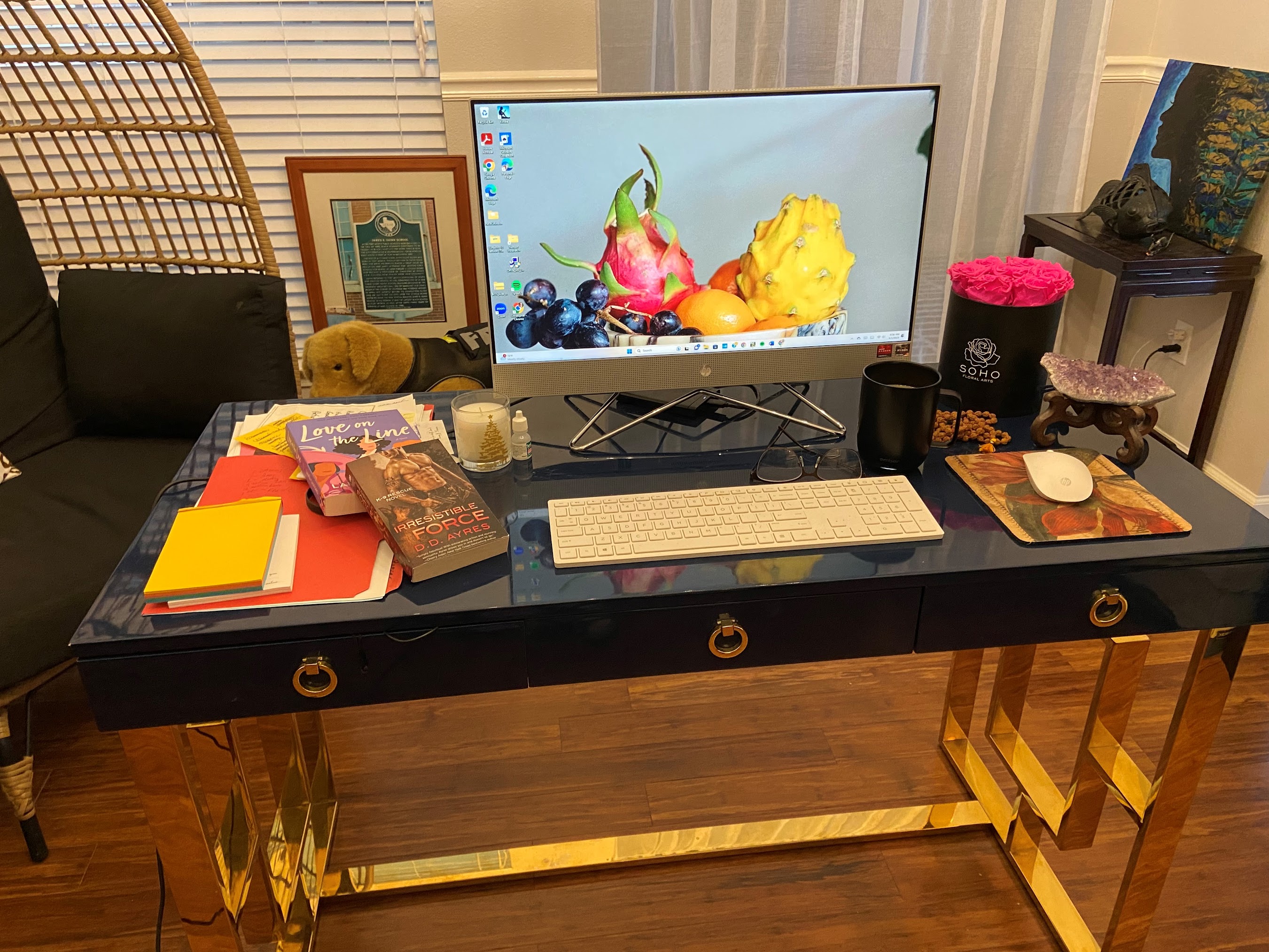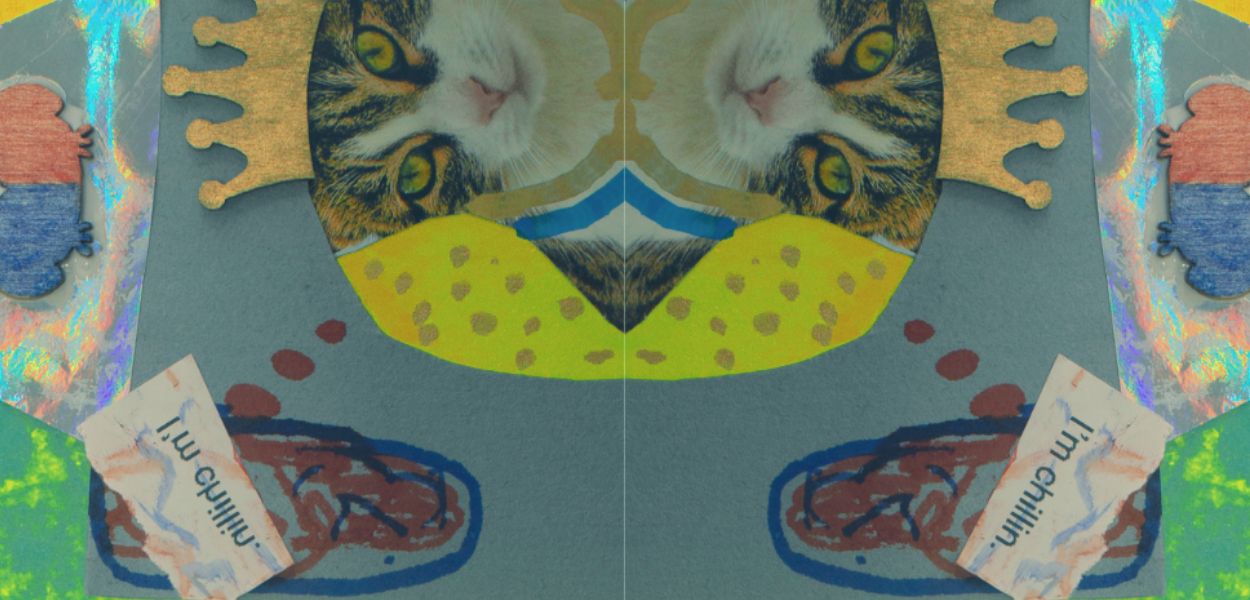The Writer’s Desk features the desks and writing practices of Gemini Ink faculty, visiting authors, teaching artists, volunteers, students, interns, staff, partners and more. Receive new posts in your inbox by subscribing to our newsletter at bit.ly/geminiinknewsletter.
Join Laura Castoro on Wednesdays, January 17, 24, 31 & February 7, 6:30-8:30pmCST, Hybrid: Via Zoom or in person, for her workshop: So, You Want to Write Romance with Laura Castoro. In this 4-session, generative workshop, we will guide writers through the creation of an emotionally resonant plot with a unique slant and irresistible characters for a fascinating and unforgettable romance. Yes, there will be sex scenes!
- Hi Laura, thanks for taking the time to chat with us today. Can we start with you describing your first writing desk? How is it different (or not) from your current writing desk?
My first desk was the dining room table, and I wrote longhand.
I had no intention of becoming a writer. I had just run out of something to read, and with two kids in diapers, I couldn’t decamp to the library. But I’d read a historical romance that I couldn’t get out of my mind. The hero annoyed me. I thought the heroine could do better. Who knows why I thought I should put my ideas down? This was long before writers’ groups and creative writing classes. But I’ve always loved to read. Anything and everything. Writing became my private hobby. Then we moved, and a closet literally became my writing space. We put a small desk in there. That’s where I finished the first book.
Now, I have my own room. It’s only for me to write in with a computer and lots of books. My desk is a decadent shiny sapphire and gold beauty. And a comfy chair for reading.
- Do you like things to be carefully planned out or do you prefer to just go with the flow? Does this also apply to how you lay out a story?
My best stories begin with voices and images in my head. They can be prompted by anything: another book, a song, a conversation, even a headline. I don’t know if I have a book. But something compels me to write down what is running through my mind. Often, I don’t know if it’s the beginning, the middle, or even a story. That’s not important. I always go with this urge because sooner or later I will get to the point of, “And what now?” When I can answer that question, I have an idea that will develop into a plot.
Sounds weird but fiction writers are never alone.
We live with our characters. One of my favorite books, “A New Lu,” began with a monologue from a character named Tallulah who emerged during an 8-hour solo drive to Houston, TX to visit my daughter. I was wondering how a woman, 50 years old and recently divorced, could become accidentally pregnant. Boy, did she have a lot to say! By the time I reached my destination she had given me the entire plot for “A New Lu.” I spent the first 2 ½ hours of my visit in my son-in-law’s office typing as fast as I could. P.S. It’s a comedy. My agent sold it over the weekend. Fastest sale ever.
While other authors work from tight outlines and swear by them, I’ve learned to trust this seat-of-the-pants beginning to a story. It was the way I wrote my first book and works as I sketch out my latest. It’s scary but “what if?” keeps me thinking and plotting and working through a book.
- Which words or phrases do you most overuse?
“But,” “and,” “because” & “so.” I edit them out as much as possible. I call over-writing and redundant phrases, “scaffolding.” During the initial draft, writers are trying to tell the story as quickly as it comes to mind. Words matter but the ideas matter most. Scaffolding holds the story/scenes together while they’re being constructed. During editing or revision, the scaffolding comes down to reveal the final and best version.
- Do you have any habits or routines that you follow before writing?
I’m a morning writer.
If the day doesn’t start with words, I may not get anything done. That’s because when I began writing I had 3 small children. I was an at-home mother, a college senior with 23 hours to go on a B.S. in micro-biology. About to enroll for that final year, I was invited to submit my first book, an historical romance, to Dell Publishing. They bought it! The first book I wrote: “Silks and Sabers.” Really?!?! It was a hobby, right? My editor asked if I had another book. Fingers crossed, I said yes. Instead of enrolling for that final year, I decided to see how far this writing business would take me.
43 years and 47 published books later, I’m still here.
The reason for this backstory was that I was accustomed to getting up, getting kids and husband out the door, cleaning, washing…you see where this is going. It’s noon. Household great. Writing, none. So, I flipped the script. I got everyone up and out. Then, before showering and dressing, I went to write. That housework was still there at noon. If it’s a good day I can go back for an afternoon of writing or editing. If I’m approaching a deadline, I will write into the evening. But I’m better off at 5:30am. Can’t spell my name after midnight.
- How important is it to you to have stability in your writing routine?
As you can tell from the above, stability doesn’t seem to be a strong suit in my life. I’m very adaptable. I’m a B personality. I’ve written in airports, in the car, on planes, cross-legged on hotel beds on holiday, while helping with my daughter’s newborn twins, even recovering from surgery. Whenever and wherever. The only corner where the A part of my personality comes through is in my writing process.
I work long and hard to get it right.
Research has always played a role in my storytelling, historical and contemporary. For the “K-9 Rescue Series” I interviewed, and made friends with K-9 police officers, arson investigators with bomb K-9s, K-9 trainers of police, FBI, and military dogs, as well as K-9 trainers of service dogs for the disabled and those with emotional issues such as PTSD. Writer friend Diane Kelly of the “Paw Enforcement Series” and I were able to talk ourselves into attending a professional K-9 Police Conference in Las Vegas several years ago. We met and attended classes with international search and rescue teams, avalanche teams, cadaver dog teams, military parachute teams, Aussie police officers and others. Every type of team trains dogs differently, according to the job they do. I learned that while they may be very different in breed, temperament, and ability, working K-9s are the Mensa and Olympic champions of their kind. Not the family pup.
My stories are fiction – make believe – but accuracy in details makes me a better storyteller because I have parameters to work within. It also made each of the K-9 Rescue Series’ six books unique and specific to the type of professional dog(s) I wrote about.
- What are some misconceptions about being a writer that you can discredit?
Many people wish they could write but feel they don’t have the right something: background, degree, experience, or whatever. Wrong. Maybe not everyone can be a professional writer but anyone from any walk of life might be a writer. Not the world’s best speller? I own 5 thesauruses and several dictionaries. Go for it.
“Write what you know,” is an adage about choosing a subject. I always add when teaching, if you don’t know much about a subject that interests you, learn about it. K-9 research, for instance. Yes, there are advantages to writing about the world you live in but many writers write about things that never happened hundreds of years ago, or set in another universe, or on our world but filled with fantastical creatures. Go for it.
The misconception that annoys me? It’s that stories flow out of writers without much effort.
More than one person has said to me over the years. “Oh, you’re a writer? How nice that you don’t have to work for a living.” Just wow. Writers work very hard. Don’t let the story about Lu fool you. “A New Lu” was book 30-something in my output. Years of effort go into having a book appear like that. There are moments in nearly every book, of course, where the writer is reading behind the line of type appearing on the screen to see what happens next. We call it being in the zone. But books are rarely easy. Writers work alone. We can work for months with no feedback until we deliver the finished work. Sometimes a book doesn’t get as good a reader reception as was hoped for. It’s just as hard to write an unsuccessful book as a successful one. Writers do most of their PR and advertising these days. There are ten times the number of things writers are responsible for compared to 20-30 years ago. It’s a full-time job, and then some. That said, I love being creative. Wouldn’t trade my career for any other.

Laura Castoro, a USA Today, Amazon top 100, and Apple Books bestseller, has published 47 novels with major publishing houses such as Dell Books, Berkley, Avon, Warner, MIRA, Harlequin, Kensington, Pocketbooks, St, Harper Collins, Martins Press, and William Morrow. She has also contributed to several fiction anthologies and has published non-fiction YA and short fiction in Good Housekeeping. Under the name Laura Parker, she writes historical and contemporary romance, westerns, and sagas. As Laura Castoro, she writes contemporary African American and contemporary women’s fiction. Writing as D. D. Ayres, she publishes a romantic suspense series called the K-9 Rescue Series. Her current release as Laura Castoro is Love On The Line (2021) through William Morrow.
Laura has won multiple national writing awards. In 2005 she was inducted into the Arkansas Writers’ Hall of Fame. She is a past president of Novelists, Inc. (2013), an international professional fiction writers’ organization. She is a past president and board member of the Writers Colony at Dairy Hollow, a writer residency program in the AR Ozarks. She is a speaker at numerous conferences and workshops in the U.S. and abroad. Laura currently lives in San Antonio, TX. Visit www.ddayres.com.



